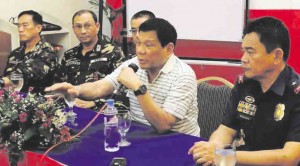
Davao City Mayor Rodrigo Duterte, with police and military officials. Photo courtesy of the City Information Office
DAVAO CITY, Philippines — Mayor Rodrigo Duterte admitted that he chanted “Mabuhay ang NPA” during the release of two government soldiers somewhere in the mountains of Laak, Compostela Valley on Tuesday.
The New People’s Army (NPA) earlier explained that Private First Class Niño Alavaro and Pfc Marjon Añover were nabbed in a guerrilla checkpoint in Monkayo town, Compostela Valley province in September 30 and were brought for investigation for possible “crimes against humanity” and “counter-revolutionary activities.”
“Mabuhay ang NPA, and I will not take that back,” Duterte said during his Sunday television show Gikan sa Masa, Para sa Masa.
But Duterte clarified that the commendation for the communist movement was in recognition of their “fair treatment” of “prisoners of war.”
“Wala akong nakita na inabuso nila na bihag. (I didn’t see cases of abused and maltreated prisoners). Because they say they follow the Geneva Convention,” Duterte said.
The controversial mayor said that the NPA has been “religiously following” international laws on the handling of captured policemen and soldiers.
“I salute you because you handed over the captives,” Duterte said, adding that he also jokingly chanted “Mabuhay si Duterte,” which got a favorable response from the NPA rebels.
“Bantay lang kayo sa election (Just guard the election),” he said in jest.
Duterte said that since war could not be stopped, he was happy to at least know that communist guerrillas would treat future “prisoners of war” according to the Geneva Convention.
He said negotiations for the release of captive soldiers were channeled through the National Democratic Front and not the NPA.
“You don’t deal with the NPA… You negotiate with the NDF,” Duterte said.
The National Democratic Front is the united front of several revolutionary organizations in the country led by the Communist Party of the Philippines. It is also the body that represents the communist movement in the peace negotiations with the government.
Peace advocates are calling on both the government and the NDF to resume the stalled negotiations to address the root causes of the conflict.
In the Hague Joint Declaration in 1992, both parties agreed to tackle substantive agenda including human rights and international humanitarian law, socio-economic reforms, political and constitutional reforms, end of hostilities and disposition of forces.
In March 1998, both parties signed the Comprehensive Agreement on Respect for Human Rights and International Humanitarian Law (CARHRIHL).
The government and the NDF panels have already formulated their drafts for the Comprehensive Agreement on Socio-Economic Reforms (Caser) but the process has not made any progress after the talks hit a snag.
The guerrilla war in the country is considered one of the longest running communist movements in Asia. SFM